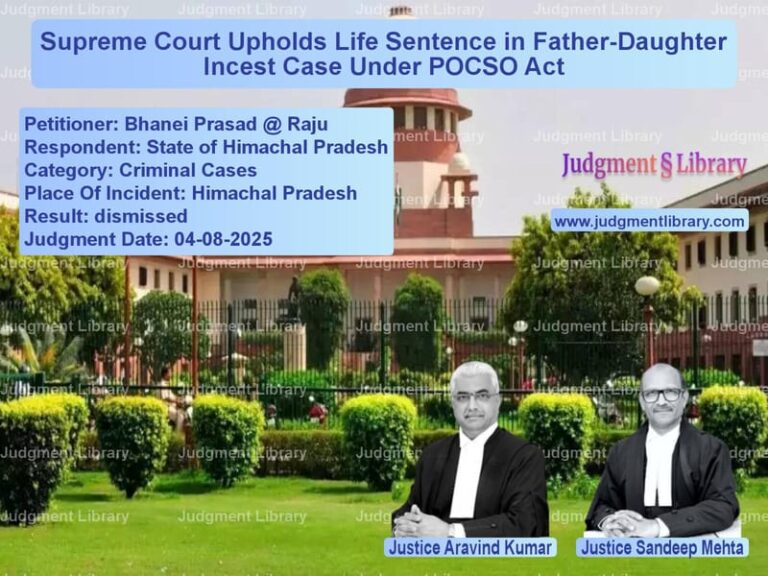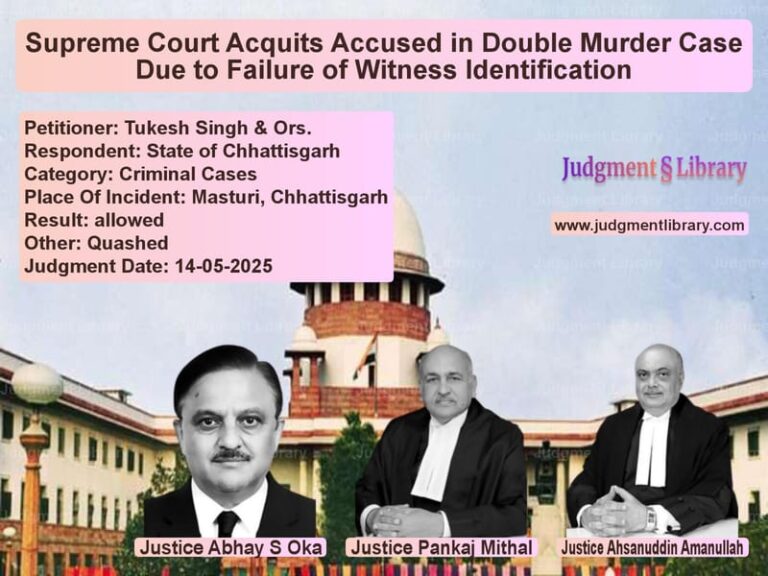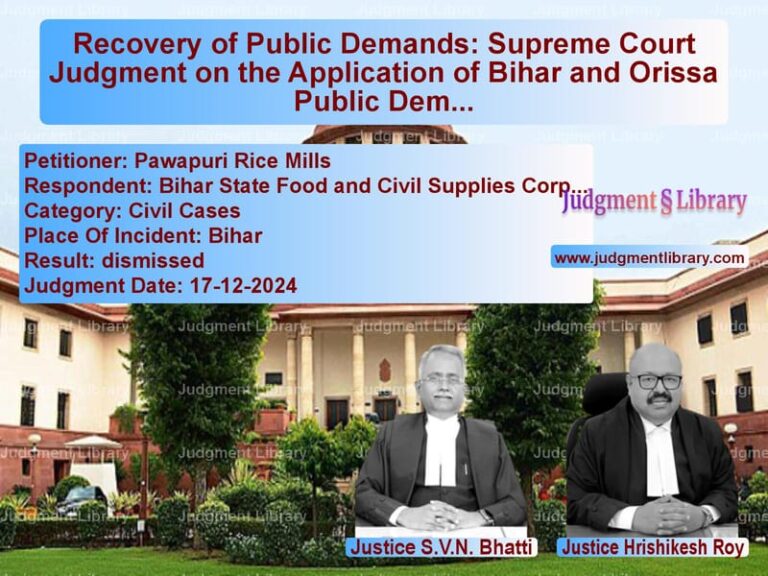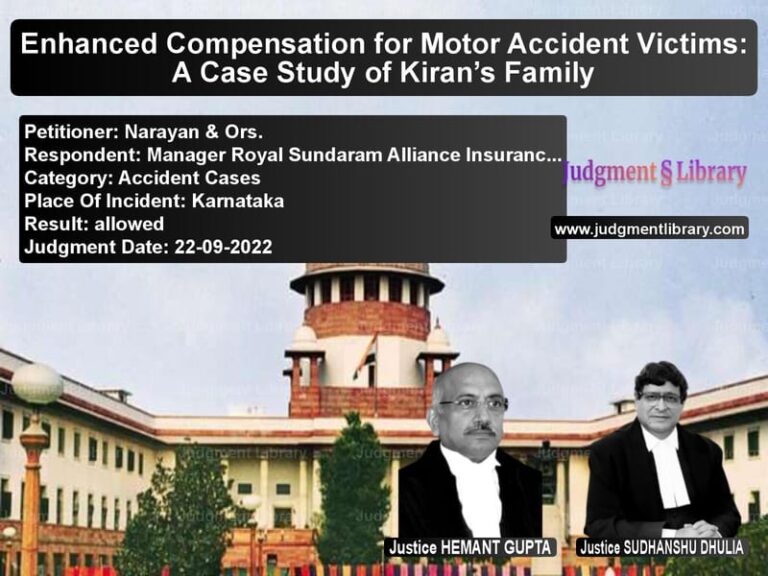Supreme Court Acquits Man in Alleged Rape Case Citing Lack of Evidence
The Supreme Court of India recently ruled on a contentious case in Pankaj Singh v. The State of Haryana, where the appellant was acquitted of rape charges due to lack of credible evidence. The case, which revolved around the nature of consent, reliance on digital evidence, and the burden of proof, has significant implications for how courts assess allegations in sexual offense cases.
Background of the Case
The case involved the appellant, Pankaj Singh, who was convicted by the Trial Court for the offenses punishable under Sections 342 (wrongful confinement), 376 (rape), and 201 (causing disappearance of evidence) of the Indian Penal Code (IPC). The appellant was sentenced to life imprisonment and fined Rs. 1,00,000. However, he was acquitted of charges under Sections 365 (kidnapping), 354D(1)(ii) (stalking), and 506 (criminal intimidation).
The prosecution’s case was based on the testimony of the complainant (Prosecutrix), who alleged that the appellant tricked her into going to a guest house where he sexually assaulted her and took objectionable photographs to threaten her.
Read also: https://judgmentlibrary.com/cbi-vs-r-c-sabharwal-supreme-court-rejects-discharge-in-corruption-case/
Petitioners’ Arguments
The defense, representing Pankaj Singh, argued:
- The relationship was consensual, as evidenced by the continued WhatsApp communication between the appellant and the Prosecutrix even after the alleged incident.
- The Prosecutrix voluntarily accompanied the appellant to multiple locations, including a guest house, without raising any alarm.
- The Prosecution failed to produce CCTV footage from the guest house, which could have shown that both individuals entered and exited willingly.
- Medical evidence did not support the claim of forced intercourse, as no external injuries were found on the Prosecutrix.
Respondents’ Arguments
The prosecution, representing the State of Haryana, countered:
- The Prosecutrix’s testimony was credible and consistent.
- Section 114A of the Indian Evidence Act should apply, which presumes lack of consent in cases of rape.
- Technical grounds, such as the absence of physical injuries, should not invalidate the Prosecutrix’s testimony.
- Even if the Prosecutrix did not resist or raise an alarm, her testimony alone was sufficient to establish non-consensual intercourse.
Supreme Court’s Observations
The Supreme Court closely examined the evidence and noted multiple inconsistencies in the prosecution’s case. The key observations included:
- Failure to establish lack of consent: The Prosecutrix’s voluntary participation in events leading up to the incident, including extensive WhatsApp communication, undermined the claim of coercion.
- Missing evidence: The Court found it suspicious that the prosecution did not present CCTV footage from the guest house, which could have clarified the nature of the incident.
- Contradictions in testimony: The Prosecutrix had initially provided details that did not match later statements, leading to doubts about the veracity of her claims.
- Medical evidence: The absence of injuries contradicted the allegation of forceful rape.
Key Judicial Remarks
The Supreme Court, in its judgment, made several critical remarks:
“The cumulative effect of the above discussion is that it is very unsafe to rely upon the testimony of the Prosecutrix in this case.”
On the issue of evidence, the Court emphasized:
“The prosecution had no reason to withhold such an important piece of evidence as the CCTV footage. The failure to present it raises doubts about the case.”
The Court also addressed the application of Section 114A of the Evidence Act:
“The presumption under Section 114A does not automatically apply unless the case falls within the specific conditions outlined in Section 376(2). Since no charge was framed under Section 376(2)(f), the presumption cannot be invoked.”
Final Judgment
The Supreme Court ruled:
- The conviction of Pankaj Singh was set aside.
- He was acquitted of all charges.
- The trial court’s and High Court’s judgments were overturned.
- The appellant’s bail bond was canceled.
Conclusion
This ruling underscores the importance of evaluating evidence thoroughly before convicting an individual in a sexual offense case. The Court’s emphasis on procedural fairness, scrutiny of digital evidence, and adherence to legal presumptions ensures that justice is not compromised. The judgment serves as a precedent for future cases where allegations must be substantiated beyond a reasonable doubt.
Petitioner Name: Pankaj Singh.Respondent Name: The State of Haryana.Judgment By: Justice Abhay S. Oka, Justice Ujjal Bhuyan.Place Of Incident: Haryana, India.Judgment Date: 21-03-2024.
Don’t miss out on the full details! Download the complete judgment in PDF format below and gain valuable insights instantly!
Download Judgment: pankaj-singh-vs-the-state-of-haryana-supreme-court-of-india-judgment-dated-21-03-2024.pdf
Directly Download Judgment: Directly download this Judgment
See all petitions in Bail and Anticipatory Bail
See all petitions in Public Interest Litigation
See all petitions in Legal Malpractice
See all petitions in Judgment by Abhay S. Oka
See all petitions in Judgment by Ujjal Bhuyan
See all petitions in allowed
See all petitions in Quashed
See all petitions in supreme court of India judgments March 2024
See all petitions in 2024 judgments
See all posts in Criminal Cases Category
See all allowed petitions in Criminal Cases Category
See all Dismissed petitions in Criminal Cases Category
See all partially allowed petitions in Criminal Cases Category







